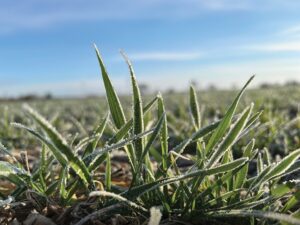Research roundup
FIND OUT WHAT’S NEW IN THE WORLD OF RESEARCH
Stem rust-resistant crops now in field trials
Megan Cowie
Newly developed Ontario winter wheat varieties that are resistant to stem rust disease are now going through trials in Ontario.
University of Guelph research scientist Dr. Lily Tamburic-Ilincic is collaborating with Dr. Tom Fetch from Agriculture and Agri-Food Canada to develop Ontario wheat varieties that are resistant to the devastating fungal disease.
Stem rust disease (strain Ug99) is affecting wheat crops in Africa, Asia and the Middle East, generating concern about the susceptibility of wheat crops worldwide. The Guelph-based team has been developing double haploid lines resistant to the stem rust as well as another fungal disease Fusarium head blight.
Their wheat varieties will be valuable for wheat growers and seed companies in Eastern Canada, who need winter wheat that is resistant to diseases.
“The goal is to bring disease resistance, quality and agronomic traits useful for growers and industry to winter wheat varieties,” says Tamburic-Ilincic.
This work is supported by the Canadian Field Crop Research Alliance (CFCRA) and Agriculture and Agri-Food Canada (AAFC) through AAFC’s Developing Innovative Agri-Products initiative. Grain Farmers of Ontario is a founding member of the CFCRA. •
Bread study sprouts new information about diabetes
Maggie Robertson
Type 2 diabetes is high — and growing — in Canada and the United States. But new information shows that the risk may be decreased by eating a certain type of bread.
University of Guelph Professors Terry Graham, Alison Duncan and Lindsay Robinson from the Department of Human Health and Nutritional Sciences, have shown that bread made from sprouted grain can modify glycemic indicators that contribute to type 2 diabetes and heart disease.
They tested three whole grain breads (sprouted grain, 11 grain and 12 grain), sourdough white and regular white, to measure differences that processing had on metabolic response such as blood sugar and blood insulin.
The researchers gave participants each type of bread and then measured their blood sugar and blood insulin response. Results showed the sprouted grain bread variety caused a positive metabolic response.
“The nature of the bread you’re eating will alter how the gut responds to it,” says Graham.
Future studies will continue to focus on how differences in bread processing can influence type 2 diabetes and heart disease through other mechanisms.
Collaborators on this research include Prof. Rickey Yada and recent Ph.D. graduates Anita Mofidi Najjar and Amy Tucker.
This research was funded by the Ontario Ministry of Agriculture, Food and Rural Affairs. Stonemill Bakehouse provided the artisan breads for this study. •
Roundup, manganese and soybean yields
Katharine Tuerke
Glyphosate herbicides, including Roundup®, provide cost-effective weed control and protect yields in crops such as soybeans. However, glyphosate is suspected to cause manganese deficiency (yellow flash) in soybeans. Unfortunately, tank-mixing manganese with glyphosate herbicides reduces their effectiveness in weed control so a better solution is needed.
University of Guelph’s Professor Emeritus Dave Hume, from the Department of Plant Agriculture, is investigating whether Roundup® decreases soybean yield and if there is a way to apply manganese and Roundup® together without decreasing the effectiveness of the herbicide.
To date, Hume has conducted eight trials in Central Ontario where either Roundup® was applied followed by a foliar application of manganese ten days later or only Roundup® was applied. In the fields tested so far, Hume determined that applying Roundup® did not cause enough manganese deficiency to reduce yield.
“Although most Central Ontario fields are unlikely to respond to foliar manganese after Roundup® there are other problems that could decrease yield such as increasing numbers of Roundup® resistant weeds,” says Hume. •
Research Roundup is provided by members of SPARK (Students Promoting Awareness of Research Knowledge) at the University of Guelph’s Office of Research. For more information, contact a SPARK writer at 519-824-4120, ext. 52667.
























